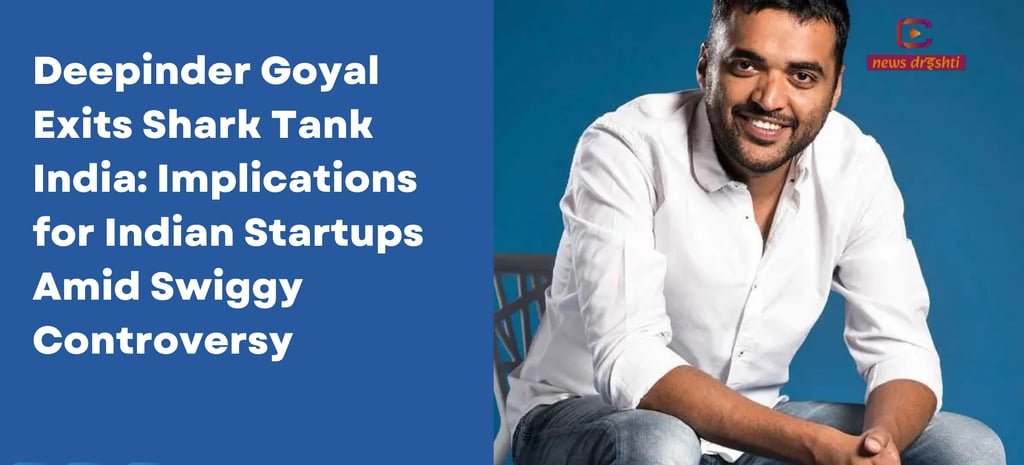Deepinder Goyal Exits Shark Tank India: Implications for Indian Startups Amid Swiggy Controversy
Deepinder Goyal's departure from Shark Tank India raises concerns for the startup ecosystem, highlighting challenges in the food delivery sector and the need for sustainability. As investors become more discerning, aspiring entrepreneurs must adapt and recalibrate their strategies to navigate a rapidly evolving landscape filled with competition
BUSINESS


Introduction to the Controversy
Over the past decade, the Indian startup ecosystem has witnessed remarkable growth and innovation. However, recent developments concerning Deepinder Goyal, the CEO of Zomato, have ignited discussions, culminating in his exit from the widely watched reality series, Shark Tank India. This decision goes beyond personal choice; it highlights the challenges confronting startups in India. In this blog post, we will analyze the implications for Indian startups and how they align with the growing interest in investment within the country.
The Shark Tank Experience and Its Influence
Shark Tank India has become a prominent platform for aspiring entrepreneurs to present their innovative concepts to a panel of investors known as 'sharks.' As a shark, Goyal has been a significant figure whose expertise has been invaluable for many startups seeking financial backing. His departure from the show raises concerns about the future availability of mentorship for budding entrepreneurs. Furthermore, Goyal's involvement lent considerable credibility to the program. This raises an important question: what does his exit mean for the credibility of the show and the guidance available to startups?
Startup Landscape Amidst Controversy
The controversy surrounding Goyal's decision to step away from Shark Tank India is closely linked to the challenges organizations face within the food delivery sector. As a leading player in the industry, Swiggy's recent struggles highlight a broader issue that many startups must navigate: achieving sustainability in a competitive market. Investors are becoming more selective as they assess the long-term prospects of businesses, which could have profound consequences for the startup landscape.
Additionally, Goyal's exit from Shark Tank India could serve as a cautionary reminder to both entrepreneurs and investors about the inherent volatility in the startup ecosystem. Aspiring founders need to be prepared for not only competitive dynamics but also sector-specific challenges that could affect their business strategies. With an increased focus from investors, potential backers may look for startups that demonstrate resilience and adaptability.
Conclusion: A New Era for Indian Startups
In summary, Deepinder Goyal's exit from Shark Tank India, coinciding with ongoing controversies surrounding Swiggy, sends shockwaves through the Indian startup community. This moment marks a crucial turning point, suggesting that entrepreneurs may need to adjust their strategies to navigate an evolving environment. Despite the obstacles, this situation offers startups a chance to demonstrate their capabilities and adapt to new challenges. As the startup landscape continues to evolve, it is vital for entrepreneurs to learn from these developments and strengthen their foundations—ensuring they are ready for both competition and heightened investor scrutiny.
